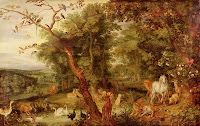As we have seen in previous posts, Biblical shalom involves wholeness, delight, and a sense of meaning and purpose for all of God’s creation. Shalom is the way things are supposed to be.
This post is the beginning of a new series on these four dimensions of shalom. Let’s start with peace with nature.
 |
| “The Garden of Eden” Jan Brueghel the Elder, 1615. |
On the following day, Genesis records God’s creation of land animals, including livestock, insects and “wild animals” and again it is noted that “God saw that it was good.” The beauty and harmony of nature was clearly evident in God’s unfolding work during the first five days of creation.
On the sixth day, God “created man in his own image . . . male and female he created them.” Genesis 1:28 describes God’s special blessing on his human creations and summarizes their responsibility: “fill the earth and subdue it.” This instruction from God has been called the “cultural mandate.” It is interesting that God first gives humanity instructions about work before he gives instructions about worship. He gave a hoe before he gave a candle!
Genesis 2:15 tells us that God places Adam in the Garden of Eden “to work it and take care of it.” God then instructed Adam to name all of the animals in the Garden. This act of naming the animals establishes Adam’s dominion and ownership over the animals, in the same way that God’s naming of “night” and “day” on the first day of creation (1:5) established his ownership over the universe. Dominion and ownership do not mean the right to exploit or to abuse animals, but to care for them as a trustee of God. Peace within the created order was God’s original intention and is an essential part of Biblical shalom.
So What?
- When I was young, I never heard any sermons about peace with nature. I heard pastors talk about peace with God and peace with ourselves, but this was one of the missing dimensions of shalom. For followers of Jesus, living at peace with our natural surroundings is part of our calling. We are trustees of God and we need to care for his creation. Our challenge is to work hard to be good trustees and not polluters. Recycling is just one small way we can reduce waste. Can you think of others?
- When we think about the beauty and diversity of our world, the richness of its animal life, and the splendor of its mountains and valleys, this reflection should make us more sensitive to our role as good stewards of “our Father’s world.”